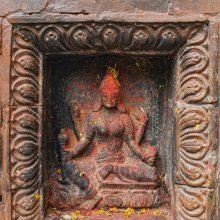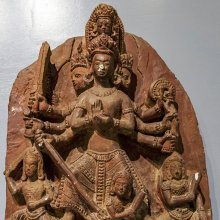Siddhidatri, Siddhidātrī, Siddhi-datri: 3 definitions
Introduction:
Siddhidatri means something in Hinduism, Sanskrit. If you want to know the exact meaning, history, etymology or English translation of this term then check out the descriptions on this page. Add your comment or reference to a book if you want to contribute to this summary article.
Images (photo gallery)
In Hinduism
Shaktism (Shakta philosophy)
Source: Hare-Krsna: Nava-DurgāSiddhidātrī (सिद्धिदात्री) refers to one of the nine Navadurgā which literally means the “nine forms of Goddess Durgā”, and constitute, according to Vedic scriptures, the manifestation of Durgā in Her nine different aspects. [...] Each goddess [viz., Siddhidātrī] has a different form and a special significance.

Shakta (शाक्त, śākta) or Shaktism (śāktism) represents a tradition of Hinduism where the Goddess (Devi) is revered and worshipped. Shakta literature includes a range of scriptures, including various Agamas and Tantras, although its roots may be traced back to the Vedas.
Languages of India and abroad
Sanskrit dictionary
Source: DDSA: The practical Sanskrit-English dictionarySiddhidātrī (सिद्धिदात्री).—an epithet of Durgā.
Siddhidātrī is a Sanskrit compound consisting of the terms siddhi and dātrī (दात्री).
Source: Cologne Digital Sanskrit Dictionaries: Monier-Williams Sanskrit-English DictionarySiddhidātrī (सिद्धिदात्री):—[=siddhi-dātrī] [from siddhi > sidh] f. ‘giver of perfection’, Name of a form of Durgā, [Catalogue(s)]
Sanskrit, also spelled संस्कृतम् (saṃskṛtam), is an ancient language of India commonly seen as the grandmother of the Indo-European language family (even English!). Closely allied with Prakrit and Pali, Sanskrit is more exhaustive in both grammar and terms and has the most extensive collection of literature in the world, greatly surpassing its sister-languages Greek and Latin.
See also (Relevant definitions)
Partial matches: Datri, Siddhi.
Query error!
Relevant text
Search found 4 books and stories containing Siddhidatri, Siddhidātrī, Siddhi-datri, Siddhi-dātrī; (plurals include: Siddhidatris, Siddhidātrīs, datris, dātrīs). You can also click to the full overview containing English textual excerpts. Below are direct links for the most relevant articles:
Shiva Purana (by J. L. Shastri)
Chapter 33 - The March of Vīrabhadra < [Section 2.2 - Rudra-saṃhitā (2): Satī-khaṇḍa]
World Journal of Pharmaceutical Research
Nine medicinal herbs for Navratri symbolize healing and prosperity. < [2022: Volume 11, May issue 5]
Devi Tantra, Mantra, Yantra (study) (by Srider Basudevan Iyer)
Later Vedic goddesses (1): The Earth or Prithivi < [Chapter 2 - The Maior Goddesses]

